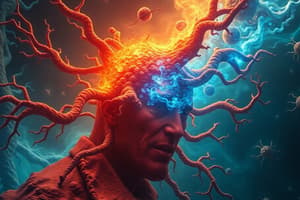Podcast
Questions and Answers
Which of the following is a characteristic of nonspecific immunity?
Which of the following is a characteristic of nonspecific immunity?
- It includes physical barriers like the skin. (correct)
- It recognizes specific antigens.
- It provides long-term immunity.
- It requires prior exposure to pathogens.
What is the primary role of antibodies in the immune system?
What is the primary role of antibodies in the immune system?
- They create memory cells.
- They neutralize toxins and promote phagocytosis. (correct)
- They directly destroy pathogens.
- They initiate inflammation.
What distinguishes active immunity from passive immunity?
What distinguishes active immunity from passive immunity?
- Active immunity does not involve exposure to pathogens.
- Active immunity develops after vaccination, while passive does not. (correct)
- Active immunity is immediate, while passive is delayed.
- Active immunity is temporary, while passive immunity lasts longer.
Which type of T cell is primarily responsible for cell-mediated immunity?
Which type of T cell is primarily responsible for cell-mediated immunity?
Which functional characteristic is unique to phagocytes?
Which functional characteristic is unique to phagocytes?
What triggers the complement cascade in the immune response?
What triggers the complement cascade in the immune response?
Immediate allergic responses primarily involve which type of immunity?
Immediate allergic responses primarily involve which type of immunity?
What is a key feature of inherited immunity?
What is a key feature of inherited immunity?
What is the primary role of lymphatic vessels in the lymphatic system?
What is the primary role of lymphatic vessels in the lymphatic system?
Which structure in the lymphatic system is primarily responsible for immune cell development and interaction?
Which structure in the lymphatic system is primarily responsible for immune cell development and interaction?
What type of immunity is characterized by the body’s ability to recognize and respond to pathogens it has encountered before?
What type of immunity is characterized by the body’s ability to recognize and respond to pathogens it has encountered before?
How does the thymus contribute to the immune system?
How does the thymus contribute to the immune system?
What is one of the primary functions of the spleen?
What is one of the primary functions of the spleen?
Which lymphatic organ is involved in direct immune responses to pathogens ingested or inhaled?
Which lymphatic organ is involved in direct immune responses to pathogens ingested or inhaled?
What is the significance of lacteals in the lymphatic system?
What is the significance of lacteals in the lymphatic system?
What happens to the thymus during childhood?
What happens to the thymus during childhood?
What is the role of thymosins in the thymus?
What is the role of thymosins in the thymus?
Which component of the lymphatic system plays a role in maintaining fluid homeostasis?
Which component of the lymphatic system plays a role in maintaining fluid homeostasis?
Flashcards are hidden until you start studying
Study Notes
Immune System Overview
- Nonspecific immunity includes physical barriers such as skin, which prevent harmful agents from entering the body.
- Tearing and mucus in eyes trap and eliminate bacteria, offering an immediate defense mechanism.
- Inflammation, characterized by heat, redness, pain, and swelling, attracts immune cells to injury sites and increases blood circulation.
- Specific immunity, or adaptive immunity, involves recognition and memory of harmful substances.
Types of Immunity
- Inherited immunity provides protection from certain diseases from birth, known as inborn immunity.
- Acquired immunity can be natural (from real exposure) or artificial (through deliberate exposure like vaccinations).
- Active immunity results from either active disease exposure or vaccination efforts.
- Passive immunity is the transfer of antibodies from mother to fetus or via vaccination, providing temporary protection.
Immune System Molecules
- Antibodies are proteins that specifically bind to antigens, forming complexes that neutralize toxins and facilitate phagocytosis.
- Complement proteins enhance antibody actions and initiate the complement cascade, leading to the destruction of foreign cells by creating pores in their membranes.
- Both antibodies and complement proteins are integral to an effective immune response.
Immune System Cells
- Phagocytes, such as neutrophils, monocytes, and dendritic cells, are essential for ingesting and eliminating harmful substances.
- Macrophages and dendritic cells present antigens, initiating tailored immune responses.
- Lymphocytes—B cells and T cells—are critical to immune processes: B cells are responsible for humoral immunity, while T cells are central to cell-mediated immunity.
- Various T cells, including cytotoxic, helper, and regulatory T cells, fulfill distinct functions in immune regulation.
Hypersensitivity of the Immune System
- Hypersensitivity reactions can lead to excessive or inappropriate immune responses.
- Allergies are caused by hypersensitivity to normally harmless environmental antigens and can provoke immediate (humoral) or delayed (cell-mediated) responses.
- Understanding these mechanisms is vital for effectively managing allergic reactions and conditions.
Discussion Questions on Lymphatic System
- Lymphatic vessels enable one-way movement of lymph and play a vital role in fluid homeostasis, ensuring drainage of excess interstitial fluid and proteins back into circulation.
- Lymph nodes filter lymph and serve as sites for lymphocyte formation and immune responses against pathogens, playing an essential role in immune function.
- The thymus is crucial for T-cell development, secreting thymosins that influence T lymphocyte maturation and education; it undergoes involution with age.
- Tonsils contribute to immune responses by sampling pathogens in the throat, highlighting their role in respiratory health.
- The spleen, as the largest lymphoid organ, is involved in phagocytosis of old red blood cells and acts as a blood reservoir, critical for effective blood quality and circulation.
- Different types of immunity—such as inherited, acquired, natural, and artificial immunity—emphasize the varied mechanisms by which the body protects itself against diseases.
Studying That Suits You
Use AI to generate personalized quizzes and flashcards to suit your learning preferences.




